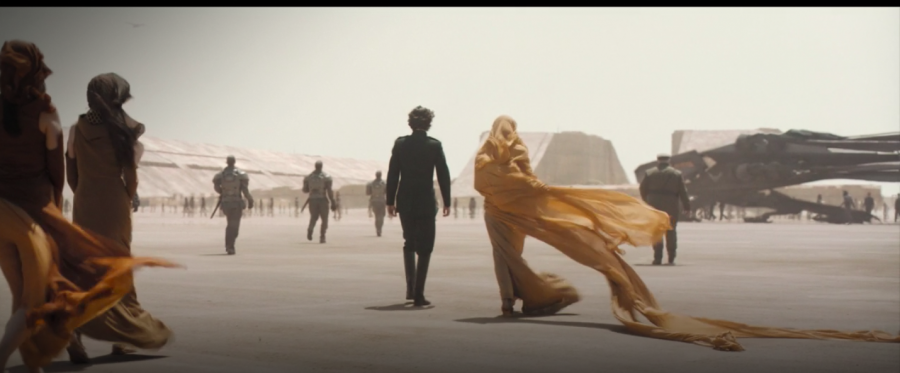Review | “Dune” is a stunning, albeit disconnected, cinematic spectacle
Dune hit theaters and HBO Max yesterday.
October 24, 2021
When I think of Denis Villeneuve — the avant-garde director of films such as “Prisoners” and “Blade Runner 2049” — I’m immediately reminded of his impactful visuals that add a layer of atmospheric potency to any scene.
Villeneuve proved that every frame in his movies will be infused with his captivating artistic vision. In that sense, he succeeds in consistently providing audiences with a visual feast. Yet, sometimes, they may only be consuming empty calories.
Villeneuve’s “Dune” is the adaptation of Frank Herbert’s science fiction novel of the same name. It tells the story of young heir Paul Atreides (Timothée Chalamet), who is prophesied to lead the galaxy to greatness, or perhaps ruin.
The bulk of the plot concerns Paul Atreides’ father, Duke Leto Atreides (Oscar Isaac), and his rule over the inhospitable desert planet of Arrakis and its Fremen natives during a time — set 20,000 years into the future — of great political strife. The production and trade of “spice” is at the forefront of the planet’s economic functionality — it is a sought-after Arrakian substance imperative for interstellar travel and the longevity of human life.
The powerful cinematic quality of this film cannot be denied. It’s a sweeping narrative transcending time and space, with a viewing experience that is meant to be enjoyed in a theater — the only way the visceral auditory and visual components can be fully appreciated.
Integral to the frames of “Dune” are a series of visions Atreides has about his fate, which are slowly revealed to us in increasing intervals throughout the story. At the center of these vivid, prophetic dreams is Chani (Zendaya), a young Fremen woman who both mystifies and compels the young heir. It is Chani’s narration that opens the film, providing both historical context and a glimpse of a world beyond Atreides’ home planet of Caladan.
The film presents us with the classic trope of a young protagonist tasked with answering the call of his destiny, following in the same epic tradition of a science fiction odyssey. Yet, while the movie is certainly just as immersive and grand in its scope, any emotional involvement is virtually nonexistent.
Perhaps the pacing of the film, which is rather overwhelming in scale, is partly to blame. Not being one for exposition, Villeneuve expects the audience to already be well-versed in the desert world of Arrakis and its inner workings. This leaves viewers — especially those who have never read a single page of Herbert’s 1965 novel — with more questions than answers. It is that exact whirlwind of confusion that undermines the sense of emotional investment.
Maybe it’s an intentional artistic choice. Like Atreides trying to make sense of his legacy through a sporadic series of mysterious visions, we are tasked with piecing together this distant world through a rapid succession of frames. At its best, the expansive scope of “Dune” — in all of its visually stunning glory — greatly appeals to aesthetic and childlike wonder, even if you grapple to fully understand the overarching storyline.
The conflict between the native Fremen tribes of Arrakis and the invading Houses, who encroach on the former’s land for the enormously valuable spice, gives the film a fascinating undertone of political commentary.
The problem is that this plot point is not entirely developed — it is left slightly in the foreground, gasping for air between all of the various storylines that Villeneuve tried to interweave into a 2 ½-hour runtime. He had to adapt the first half of a behemoth science fiction novel, after all.
Yet, in the midst of the chaos, what kept me intrigued was the powerful, and unexpected, mother-son relationship at the forefront of the narrative. Atreides and Lady Jessica (Rebecca Ferguson), have a bond that transcends the basic fact of blood.
Lady Jessica is her son’s ultimate mentor and guide, an almost spiritual force in his life. She hails from the Bene Gesserit, an all-female organization with the wisdom to foresee and cultivate the direction of the human race. Lady Jessica devotes her life to Atreides’ protection, casting light on the daunting path that lays ahead of him.
This sense of intimacy is particularly well-developed in tense scenes. It is this complex bond that prevails throughout the duration of the film, acting as a perpetual guiding light in the increasingly murky underbelly of this ominous world.
For an intimidating project long considered to be “unfilmable” — especially in response to David Lynch’s 1984 adaptation of the novel — Villeneuve rightfully deserves some praise for this incredible undertaking, even if viewers may struggle to grasp the plot’s more complex intricacies or emotionally connect with the characters.
The sheer ambition in this portrayal, with its larger-than-life narrative and meticulous stylistic choices, ultimately makes “Dune” an awe-inspiring spectacle for any science fiction fanatic or film buff to witness.








